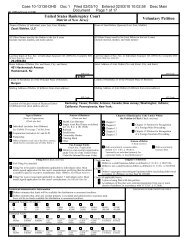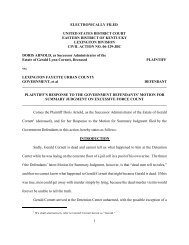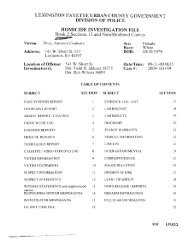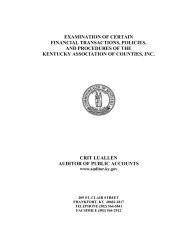ADDICTED AND CORRUPTED - Kentucky.com
ADDICTED AND CORRUPTED - Kentucky.com
ADDICTED AND CORRUPTED - Kentucky.com
Create successful ePaper yourself
Turn your PDF publications into a flip-book with our unique Google optimized e-Paper software.
PRESCRIPTION FOR PAINLEXINGTON HERALD-LEADER‘HE DIDN’T HAVE A STETHOSCOPE’From preceding pageWhen it <strong>com</strong>es to penalizing errant physicianswho already have licenses, only fourstates were tougher than <strong>Kentucky</strong> in 2001.“This is a tough board,” said Dr. Emery Wilson,dean of the University of <strong>Kentucky</strong> Collegeof Medicine. “If we know about something, wewill take action.”But state laws limit how aggressive theboard can be. Statutes make the board a “reactiveagency” that can respond to <strong>com</strong>plaintsbut can’t look for problems on its own, Vestsaid. The reason for a penalty or denial of a licensemust be rooted in one of 21 specific offenses,he said.Overall, Vest added, “We feel we do a verygood job of protecting citizens, with the resourceswe have and the statutory authority wehave.”Doctor was dubbed ‘Ray Kroc’One <strong>Kentucky</strong> lawman likes to call 51-yearoldDr. David H. Procter, the former proprietorof South Shore’s now-defunct Plaza Healthcareclinic, “Ray Kroc.” Kroc built the McDonald’shamburger chain. Procter employed a string ofdoctors who have since been indicted oncharges of pushing pills.The Canadian-born Procter got a <strong>Kentucky</strong>license in 1977. By 1983, a medical-board investigatorwas at his door, asking for recordsrelated to patients on pain pills.In 1986, the board tried to keep him fromprescribing certain narcotics. In 1987, it triedto suspend his license.Procter hired experts to assure the board hewas fixing his fast-growing practice, and thenhired lawyers to argue for him. The boarddropped its case after a hearing at which Procterpresented a detailed defense of his treatmentof 23 patients.In 1999, the board, armed with a bulgingfile of <strong>com</strong>plaints, again tried to take Procter’slicense. The <strong>com</strong>plaints included allegationsthat he pressured some patients into sexualacts during office visits, and required one tohave sex with him as a condition for prescribingtranquilizers for her.Procter fought the new board order at first,but surrendered his license in 2000. He deniedall charges and declared that his surrendercame only after injuries from a 1998 car wreckleft him mentally unable to practice medicine.Last summer, Procter was indicted alongwith two former office employees on federalcharges of conspiring to illegally distributedrugs and of writing illegal prescriptions. LikeProcter, the aides have pleaded not guilty.Procter and his attorney, Scott C. Coxof Louisville, a former federal prosecutor,wouldn’t <strong>com</strong>ment for this story. But in courtpapers, Procter blamed his co-defendants andsaid he had nothing to do with hiring the doctorswho followed him at the clinic. He said hehadn’t even met most of them.Machine guns and LorcetAmong the 15 physicians who worked forProcter between 1998 and 2002, three left afterone day or less. Others quit after a week or so,federal records show.Dr. Steven Snyder hung around a bit longer.Snyder received a license in 1997 despite amessy application. <strong>Kentucky</strong> medical boardrecords say he’d been arrested in Indiana in1985 on charges of writing illegal prescriptions,and in 1986 on charges of possessing two illegalmachine guns. Indiana suspended his licensetwice in about three years.Snyder, a <strong>Kentucky</strong> native making a pitch to<strong>com</strong>e home, suggested to the board that an undercovercop tricked him on the drug charges.He also said he was a gun collector, and thatthe weapons charges were a technicality. Anyway,all the charges were dropped for lack ofprosecution, he said. (In truth, the chargeswere dropped only after he kept out of troubleunder a pretrial diversion agreement.)Still, Snyder’s application contained an importantclue that he might have a personal drugproblem. In a 1991 affidavit he provided to<strong>Kentucky</strong>, Snyder said he had turned in his Indianalicense and moved to Florida because heresented Indiana’s demand that he be evaluatedby a psychiatrist and an addiction specialist.That kind of information about an applicantwould normally prompt <strong>Kentucky</strong> regulators torequire a similar evaluation, said Vest, the boardcounsel. But “no one in the process directed anevaluation,” he said. “I don’t have a reason.”Snyder arrived at Procter’s clinic in 1999and stayed about eight months. At times, hewas popping up to 30 Lorcet pain pills a day,board records say.In November 2000, Snyder admitted to federalagents that he had been secretly using narcotics,sometimes heavily, since his Indianadays, <strong>Kentucky</strong> board records say.Procter recalls a raucous breakup in whichhe fired Snyder because Procter caught himprescribing improperly. Snyder “pulled a pistoland pointed it at me and threatened to kill me,”Procter said in an affidavit filed as part of a civildispute with the placement service that sentSnyder to his clinic.Afterward, Snyder practiced on his own. Hebegan writing illegal prescriptions, sometimesfor patients he hadn’t met, board records say.He collected $2,100 in fees on some days.Snyder has pleaded guilty to federalweapons and drug charges. He declined to<strong>com</strong>ment, but his lawyer said he is drug-freeand cooperating with prosecutors as he awaitssentencing.Dr. Rice C. Leach, state <strong>com</strong>missioner forpublic health, was the board member whomoved to give Snyder a license. Leach said theboard sometimes gives “second chances” whenit thinks a doctor has learned a lesson.The lack of any bad reports from Snyder’sfive years in Florida also helped, said Clark, theboard president.Considering fingerprint checksIf state lawmakers and the FBI approve, <strong>Kentucky</strong>this year will be<strong>com</strong>e the 13th state to authorize criminalbackground checks as part of licensing doctors.Each applicant for a new license would pay $24to cover the cost of fingerprint checks by the FBI.The state Board of Medical Licensure could also requirea fingerprint check as part of a doctor’s annuallicense renewal.California regulators report getting a match in 5to 10 percent of cases. Most “hits” reflect minor offenses,but checks have found people with recordsof drug trafficking and even murder.Idaho reports a 2 to 3 percent hit rate. Louisianahas done fingerprint checks for three years but hasnever denied a license because of what it found.Florida started fingerprinting for new applicationsin 1998; for license renewals, in 2000. The latter stepturned up about 20 doctors who had lied, a boardspokesman said. They were fined and disciplined.CHARLES B. CAMP“Obviously, in retrospect, we wish we hadn’tissued a license,” Clark said.Millions of pills, thousands of patientsDr. Fortune J. Williams got a <strong>Kentucky</strong> licensein 1996, aided by the medical board’s inabilityto check criminal backgrounds at thetime.On his application, he failed to report a1987 California drug arrest.Williams said in an interview that he forgot,because the charges were dropped. That omissionlet him avoid special board scrutiny reservedfor applications with special questions.Had <strong>Kentucky</strong> asked about financial problemsbefore granting Williams’ license, it alsomight have found $85,500 in California statetax liens filed against him. He also had an outstandingorder to pay a child-support arrearagethat dated to 1988. Williams now says thosebills were overstated.In 2000, after a term at Procter’s clinic,Williams went to work about 20 miles away ata small cinder-block clinic in Garrison thatsprang up “like a mushroom,” said LewisCounty Sheriff Bill Lewis.As the parking lot overflowed with cars,Williams toiled inside. He prescribed morethan 2.3 million pills to more than 4,000 patientsduring a stretch of 101 working days, accordingto board records.Williams, 53, denies doing anything wrong,even as he concedes that his prescription totalin Garrison looks huge at first.“I said, ‘Wow.’ But then, when you do themath, the numbers are normal,” Williams said.“In no way did I overprescribe.”Big numbers — and crowds — weren’t exclusiveto Williams. Dr. Frederick Cohn, anotherSouth Shore alumnus licensed by <strong>Kentucky</strong>after a troubled past, turned a formerPaintsville supermarket into a clinic in 2000.Cohn said in a 2001 interview that he and anassociate signed up more than 9,000 patients inless than a year.Overall, authorities said, the pair collectednearly $1 million and prescribed more than 5million doses of controlled substances beforebeing arrested.Their files showed “no evidence of even abasic attempt to practice medicine,” the medicalboard said in the order suspending Cohn’slicense.Cohn had a long career in New Mexico beforethat state’s medical board found him“grossly negligent” while doing an abortion. Hewas put on probation. Three years later, he quitmedicine to sell real estate. He won his licenseback in 1992.Citing New Mexico’s lead, <strong>Kentucky</strong> acceptedhim in 1993, imposing a shorter probation.Cohn declined <strong>com</strong>ment, but in a 2001 interview,he said he was tricked by some patients.“I’m a very believing kind of guy,” hesaid.Coroner sends a warningBy the time Dr. Rodolfo Santos hit SouthShore in late 2001, Procter had given up his license.Snyder had been indicted; Cohn was underarrest. Williams was under investigation.But there were more problems <strong>com</strong>ing. Accordingto board records, an Ohio coroner senta Nov. 29 alert about a new drug problem inSouth Shore.One of Santos’ patients had been founddead, clutching a bottle that had containeddrugs he prescribed. “This is a familiar patternto us and warrants your attention,” Thomas O.Morris III, the coroner of nearby Scioto County,Ohio, advised.The <strong>Kentucky</strong> board quickly interviewedthe coroner, local lawmen and a federal drugagent. A federal Drug Enforcement Administrationagent told board officials that in the precedingyear, six other patients of Santos haddied of drug overdoses. A doctor who reviewed18 patient files for the board called Santos’ prescriptions“alarming.”In July, the board took Santos’ license, anda Greenup County grand jury indicted him. Butit had taken six months from the Ohio coroner’sfirst alert.Santos did not respond to several interviewrequests that were made to his lawyer.The medical board last month crafted a newpolicy requiring that “high priority” cases behandled in 90 days or less.Why didn’t regulators monitor the new doctorat Procter’s clinic from the beginning?“That’s something we probably should havebeen doing,” said Clark, the board president.But Vest, the counsel, doesn’t think theboard could have done that legally. As a <strong>com</strong>plaint-drivenagency, the board must “have areason” for investigating, and “we never hadanyone <strong>com</strong>ing in saying (Santos) was doinganything.” Vest said he doubted that allegationsabout earlier South Shore doctors would beenough.DEBBIE CALDWELL | ASSOCIATED PRESS FILE PHOTODr. Ali Sawaf was arrested at his office, Harlan Urology Clinic, in February 2001. He is now serving20 years in prison on charges that he prescribed drugs without a legitimate medical purpose. Onone winter day, Sawaf saw 133 patients even though his office had no electricity, jurors were told.Denied in Virginia,licensed in <strong>Kentucky</strong>◆DR. ALI SAWAF’S FALSEHOODSDIDN’T DETER MEDICAL BOARDOriginally published Jan. 31, 2003By Charles B. CampHERALD-LEADER STAFF WRITERThe first Eastern <strong>Kentucky</strong> doctor arrestedamid the OxyContin crackdown of 2001would not have been in business if <strong>Kentucky</strong>had used the same medical-licensing standardsVirginia does.Records show that Dr. Ali Sawaf submittedfalse information about his past in licenseapplications to both states.Virginia caught him and refused him a license.<strong>Kentucky</strong> caught him, but ultimatelygave him one.The case of Sawaf turns largely on his1997 guilty plea to felony state in<strong>com</strong>e taxcharges in Michigan. After the conviction,Michigan briefly yanked his license.In 1998, he applied for a license in <strong>Kentucky</strong>,answering “no” to questions aboutwhether he’d ever been convicted or had hislicense suspended. Two years later, when heapplied for a license in Virginia, he admittedthe conviction but denied the suspension.Today, Sawaf, 61, is serving 20 years infederal prison on drug convictions after policearrested him at his Harlan County clinicin February 2001.Long lines of patients often waited infront of the door to his office, located in ashopping center, Harlan County Sheriff SteveDuff recalled. On one winter day, Sawaf saw133 patients even though his office had noelectricity, jurors at his trial were told.“He didn’t have an examination table. Hedidn’t have a stethoscope. He didn’t have anything,except for a receptionist,” Duff said later.“I don’t know whether he thought he wasnot doing anything wrong or if he thought wewere too dumb to know.”Sawaf is appealing his conviction. He testifiedthat undercover agents lied to obtainthe prescriptions they now say were illegal.And in a handwritten note to the <strong>Kentucky</strong>Board of Medical Licensure, he has denied“all allegations brought against me.”<strong>Kentucky</strong> board officials aren’t saying muchabout their decision to give Sawaf a license,partly because he’s appealing their decision tosuspend it. That suspension came three weeksafter Sawaf’s arrest, as he sat in the HarlanCounty jail, unable to make $650,000 bail.Sawaf’s licensing was “totally a matter ofboard discretion,” said C. Lloyd Vest II, generalcounsel to the board. “You can alwaysfind cases where one state does somethingand another does something else.” He declinedfurther <strong>com</strong>ment about Sawaf. Sawaf,through his attorney, declined to <strong>com</strong>ment.Trouble with taxes and gamblingSawaf, a urologist, had been practicingmore than 23 years in Michigan’s Upper Peninsulawhen regulators suspended his license in1997 after he pleaded guilty in the tax case.He served 38 days in jail. The court alsosentenced him to five years’ probation and2,320 hours of <strong>com</strong>munity service, and toldhim to get help for a gambling problem.Sawaf argued to the Michigan Board ofMedicine that his crime didn’t endanger patients,and he had his license back in twoweeks. The following August, the Michiganboard put him on probation until he proved hewas in treatment for gambling addiction.He had been losing about $20,000 a yearat a local casino, according to Michiganrecords, but he denied being hooked.Fast-forward to 2000, when Virginia rejectedSawaf’s request for a license.The state board of medicine cited his falsestatement about his license suspension, aswell as a statement that he had never losthospital privileges, when he had.“If we find they have deceived us, it isgrounds enough” for denial, said Ola Powers,Virginia’s top licensing official. “We try tocatch them before we give them a license.”(On top of all that, Sawaf’s $200 check tocover Virginia’s application fee bounced.)License granted despite untruthsTwo years earlier, when he’d applied to <strong>Kentucky</strong>,regulators took seven months to considerhis application. They collected numerousrecords, sent him to an addiction evaluator andconducted a face-to-face interview.But while Sawaf had made false statementson <strong>Kentucky</strong>’s application — which routinechecks easily detected — the board didn’tmake an issue of them, according to records.Under state law, the board could have citedSawaf’s misstatements and felony convictionsas grounds for denying him a license.Instead, it deferred a vote and encouragedhim to settle his pending case with the Michiganmedical board.By then, Sawaf had told Michigan officialshe wanted to “practice medicine elsewhere,”according to the state’s records.Michigan quickly ordered probation onthe condition that Sawaf enter counseling forgambling addicts. He did so, and Michiganterminated the probation in less than a week.Fifteen days later, Sawaf was in Louisville,making his case to the <strong>Kentucky</strong> board. Heleft with its approval for a license.The fact that Sawaf’s crime was a tax offense— instead of a crime involving his medicalpractice — might have been a factor.“What we got him for now is a whole lot differentfrom what Michigan got him for,” saidDr. Danny M. Clark, president of the <strong>Kentucky</strong>board.Clark declared that the board “rarely willgive you a license if you lie to us.” He said hecan’t recall why Sawaf got one. “Every oncein a while, someone gets through the cracks.”<strong>Kentucky</strong> had addiction experts evaluateSawaf, but “they apparently didn’t feel he hada problem with addiction,” Clark said.After Sawaf’s arrest in 2001, <strong>Kentucky</strong>board members quickly suspended his license.Records show the board discussed, amongother things, a report that he was prescribingOxyContin and Viagra to teen-age boys.But its final order cited only the drugcharges on which he was arrested — and thefact that Virginia had denied him a license.Staff writer Lee Mueller contributed to this story.







